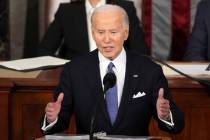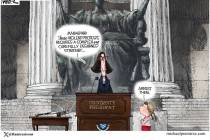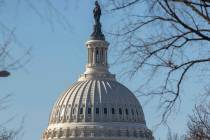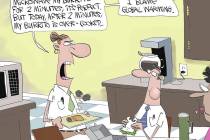EDITORIAL: Gaming and pot
Nevada gaming regulators have remarkable oversight powers that allow them to strip the licenses of casino operators who bring “discredit upon the state” or fail to protect Nevadans’ “morals.” These tools were essential in ridding Nevada’s casinos of organized crime and paving the way for corporate ownership and investment along the Strip.
The regulatory power of the Gaming Control Board and the Nevada Gaming Commission remains valuable even today. But the imminent growth of a new industry in Nevada is stretching the boundaries of state regulatory power — and leaving some to wonder if gaming oversight already might have gone too far.
The Nevada Gaming Control Board and the Nevada Gaming Commission had warned gaming license holders and applicants to keep far away from this summer’s chase for local medical marijuana licenses, citing the federal ban on the drug. This month, the control board backed up the warning by ordering a Las Vegas restaurant that was seeking a restricted gaming license to abandon its contract with slot route operator Nevada Gaming Partners.
As reported by the Review-Journal’s Howard Stutz, Sarah Familian, the wife of Nevada Gaming Partners owner Bruce Familian, is one of several people who own 8 percent of GB Sciences Nevada LLC. Last month, GB Sciences Nevada LLC was awarded one of Clark County’s 18 medical marijuana dispensary licenses by the County Commission. Other gaming license holders have stakes in medical marijuana companies, which are still months away from opening their doors and selling their first prescriptions.
Medical marijuana is legal in Nevada. Voters enshrined prescription marijuana in the state constitution more than a decade ago, and last year the Legislature finally passed legislation authorizing the licensing of cultivation and retail operations. To have one licensing authority admonish entrepreneurs to avoid investing in another licensed industry is troubling. The control board is sanctioning people who have broken no laws when there are plenty of actual lawbreakers doing robust business in Nevada hotel-casinos.
Last year, the parent company of the Palms agreed to pay a $1 million fine for failing to prevent criminal activity, including the sale of illegal drugs. According to a control board complaint, undercover agents were able to purchase cocaine from nightclub employees multiple times. And in 2011, the Hard Rock Hotel agreed to pay a $650,000 fine after control board agents purchased drugs from nightclub employees.
Criminals keep company with other criminals. They can’t be allowed to set up shop inside hotel properties. If visitors, businesses and conventioneers believe there is a good chance they’ll be victimized by criminal activity, it will cause great harm to the region’s tourist economy.
Yes, once medical marijuana cultivation and dispensary locations open across the state, everyone inside them will be violating federal law. But they’ll also be paying state and federal taxes. This is not a black-and-white issue.
And we’re not talking about prostitution, an only-in-Nevada regulated business. About half the states allow medicinal use of marijuana, and more are following suit. Two states, Washington and Colorado, have legalized recreational use of marijuana. Full decriminalization of marijuana is inevitable.
If the Gaming Control Board wants to scrutinize medical marijuana license holders, the drug shouldn’t have anything to do with it. Allegations that Clark County’s intensely lobbied medical marijuana licensing process was rigged from the start have angered outsiders and plenty of locals who spent tens of thousands of dollars trusting they’d get a fair shake.
There appear to be just three ways to move the state’s gaming regulators from their entrenched position on medical marijuana: legislative clarification in 2015; a court challenge; or Congress removing marijuana from Schedule I of the Controlled Substances Act. Here’s hoping for the latter.























